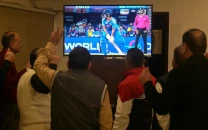PTI seeks to become a party to reserved seats case

The PTI has approached the Supreme Court for becoming a party in the reserved seats case which a 13-member full bench of the SC will resume hearing today (Thursday).
The Election Commission of Pakistan (ECP) on December 22, 2023 stripped the PTI of its election symbol in view of irregularities in its intra-party polls. The Supreme Court on January 13 upheld the ECP order, forcing the PTI candidates to contest the February 8 general elections as independents.
The independent candidates joined the Sunni Ittehad Council (SIC) after the announcement of official election results. The SIC later sought reserved seats in the parliament and provincial assemblies in proportion to its general seats.
However, the ECP on March 1 refused to allot these reserved seats to the SIC. It allocated additional reserved seats to other political parties. The Peshawar High Court (PHC) on March 25 also upheld the ECP order, prompting the SIC to approach the apex court.
In its application, the PTI has noted that the denial of reserved seats to the SIC/PTI and/or the grant of a disproportionate number of seats to other political parties is like disregarding the will of the people.
“[A] denial of the will of the people… is underway through the oppression and election fraud to which the PTI and its supporters and candidates have been subjected.
“The danger of far-reaching amendments to the constitutional and legal structure of the state through an unrepresentative parliament must be met with upholding the cardinal principles of democracy and representativeness of parliament,” it said
The PTI argued that the language of Article 51(6) (d) and (e) does not impose an absolute requirement that independent returned candidates must join a political party with at least one general seat in a house in order for such returned candidates to be counted for the purpose of the election for the reserved seats.
“The Constitution or Section 104 of the Election Act, 2017 do not require that lists for reserved seats be necessarily filed before the date of the general election,” it added.
It further contended that the 86 PTI-backed returned candidates in the National Assembly and 107 in the Punjab Assembly, 91 in the Khyber Pakhtunkhwa Assembly and 9 in the Sindh Assembly are entitled to be counted for the purpose of election to the reserved seats on the basis of proportional representation.
“The denial by the ECP of reserved seats to the SIC will result in the NA and the provincial assemblies losing their representative character. These seats cannot be allowed to any other party,” it said.
The PTI further claimed that the SIC is committed to providing lists of candidates for the reserved seats who have a long history of involvement with the PTI and engagement with the PTI voters.
“Grant of reserved seats to which the SIC/PTI are entitled to other political parties would be unconstitutional as well as unjust and unfair. No political party can be allowed reserved seats in excess of the proportion of general seats held by it in a house.
“It may kindly be noted that the PTI had filed lists of candidates for the seats reserved for women and non-Muslims in the National Assembly as well as the provincial assemblies on or before the last date for the filing of such lists by the ECP before the Feb 8 general elections.” It said many of the candidates on these lists also filed their nomination papers declaring their affiliation to the PTI.
Meanwhile, Attorney-General for Pakistan (AGP) Mansoor Usman Awan also submitted his reply before the top court in the reserved seats case.
The reply stated that the reserved seats for women and non-Muslims cannot be allocated except to political parties which contest general elections, have at least one returned candidate, and have furnished a separate list of candidates with the ECP.
The reply stated that the provisions of the Constitution should be interpreted in a manner where none of them is rendered redundant, superfluous or unworkable.
“The Constitution demands that its provisions are read in harmony,” AGP submitted.
“In this backdrop, Articles 51(6)(d) (e) and 106(3)(c) ought to be looked at alongside Article 63A.”
He further submitted that an independent returned candidate who duly joins a political party, in terms of provisos to Articles (51)(6)(d)(e) and 106(3)(c) becomes a member of such political party. “As a consequence, such a member ought to be a member of the parliamentary party of such a political party.”
The AGP further submitted that on account of becoming a member of such a political party, the independent returned candidate, after administering oath and becoming a member of a house, must necessarily become a member of the parliamentary party of such political party.
“On the other hand, Article 63A (2) mandates that an independent member can only become a member of a parliamentary party of such a political party whose, at least one, candidate or nominee won in the elections prior to such joining and constitutes a parliamentary party in a house.”
He said no candidate or nominee of the SIC, not even its chairman, got elected to any house. “Therefore, the SIC did not have a parliamentary party in any house after the general elections,” he added.


















COMMENTS
Comments are moderated and generally will be posted if they are on-topic and not abusive.
For more information, please see our Comments FAQ